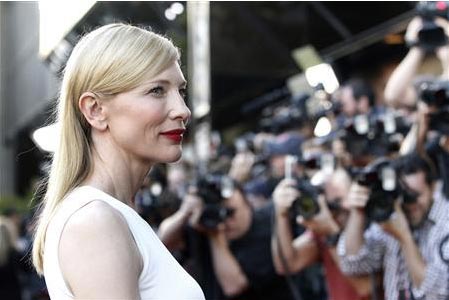Woody Allen's portrait of a lady who lost everything
 0 Comment(s)
0 Comment(s) Print
Print E-mail China Daily, August 1, 2013
E-mail China Daily, August 1, 2013
|
|
|
Cast member Cate Blanchett poses at the premiere of "Blue Jasmine" at the Academy of Motion Pictures Arts and Sciences in Beverly Hills, California July 24, 2013. The movie opens in the US on July 26.[Photo/Agencies] |
So sharp is the reversal of fortune for Woody Allen's female protagonist in his latest film, "Blue Jasmine," that the Manhattan socialite's possessions are reduced to a faint echo: a Chanel jacket, designer suitcases, a clutch of anti-depressants.
She does manage to retain a regal bearing and a posh accent. But for the most part, Jasmine, played by Oscar winning actress Cate Blanchett, has lost everything including her mind, thanks to her husband's financial and marital misdeeds and her own hapless ways.
After making a number of films in Europe, Allen didn't have to go far to find the inspiration for "Blue Jasmine," which opens in US theaters on Friday. As Blanchett says, after the financial crisis and a string of fraud cases like Bernie Madoff's epic swindle, there are many Jasmines walking the streets of Allen's Manhattan.
"I found the whole story surprising and painful and yet not surprising at all considering what's happened to a lot of people psychologically and financially," said Blanchett.
"You sit in a park and invariably you will see someone mumbling to themselves and sometimes they will be very well heeled."
"Blue Jasmine" is the Australian actress' first film with the prolific director, known for creating memorable female characters like Diane Keaton's Annie Hall. While Jasmine may be memorable, and Blanchett, 44, has received favorable reviews for the role, she is far from being a heroine or even a likeable character.
Rather, Jasmine is a cautionary tale of what happens when a woman builds her life around a wealthy husband, unaware of the house of cards in which she lives.
In flashbacks, Allen serves up sumptuous glimpses of her former life: a beautiful apartment complete with hunter green walls, a vast beach house, elegant dinners in designer dresses. Meanwhile husband Hal, played by Alec Baldwin, takes up with young women and negotiates dodgy deals while Jasmine looks the other way until it all unravels swiftly, leaving her in a heap.
'PROBABLY A CAREER KILLER'
The film opens with Jasmine traveling to San Francisco after the arrest of her husband for financial fraud and the confiscation of their assets. She is a babbling mess with no place to go except the humble home of her working-class sister Ginger, played by British actress Sally Hawkins.
"I think she finds herself in some pretty horrendous situations and you can say that she has placed herself there, but she has no support structure, or allies, or sense of self, so she is struggling for her identity," said Blanchett.
Jasmine engages in what Blanchett calls some "really unpalatable" behavior. She disapproves of Ginger's life and her choice in men, but then she herself latches onto a suave diplomat played by Peter Sarsgaard, to engineer her return to society. She lies, she manipulates, and she gives off airs, designer purse and pills always in hand.
"Blue Jasmine," from Sony Pictures Classic, is Allen's return to his home country after European jaunts in his last three films, including 2011's "Midnight in Paris" and 2012's "To Rome With Love." While those were both love letters to romantic cities and characters, "Blue Jasmine" has undertones of a Greek tragedy.
Blanchett said she drew inspiration for the role from characters both fictional and real, but Jasmine is formed mainly in Allen's mind.
"The characters are so particularly drawn in the writing," she said. "I mean that is where the majority of where his directing happens is in the script."
But she did venture to make suggestions, including for one indelible scene. The actress decided that Jasmine, who looks pretty polished from the outside for most of the film, would go out in public with her Chanel jacket but with wet hair and no make-up to show that "there is always something a bit off."
"That was probably a career killer," Blanchett said with a laugh.







Go to Forum >>0 Comment(s)